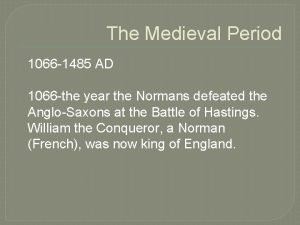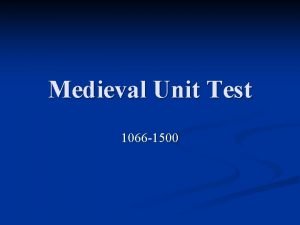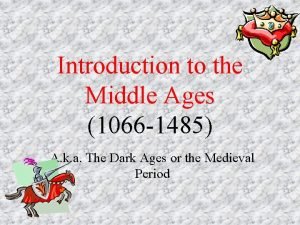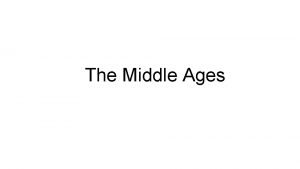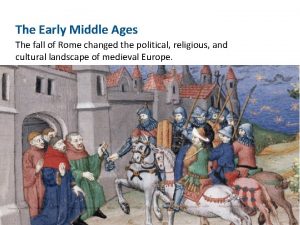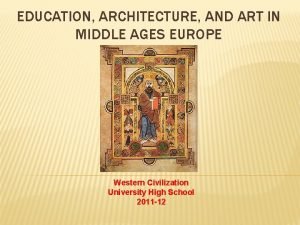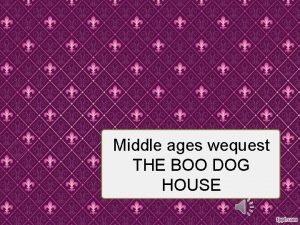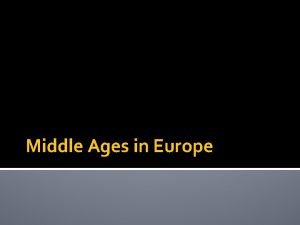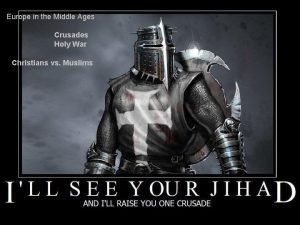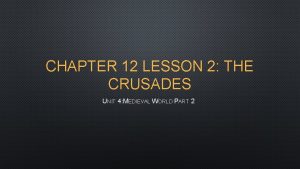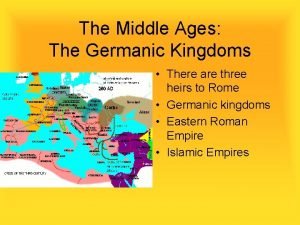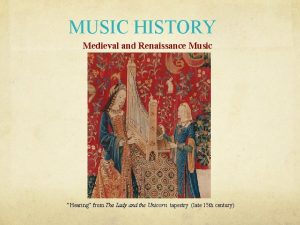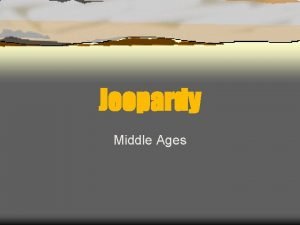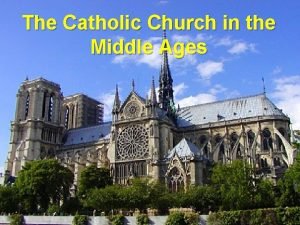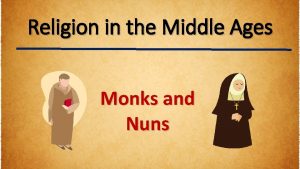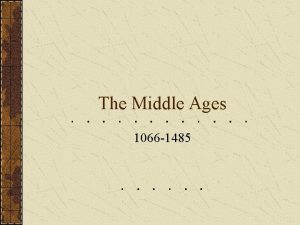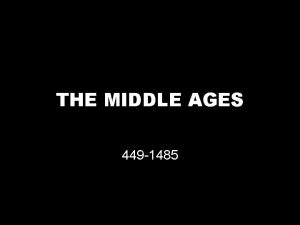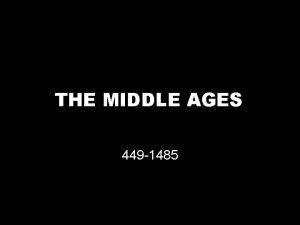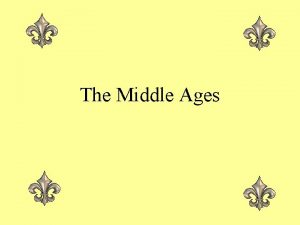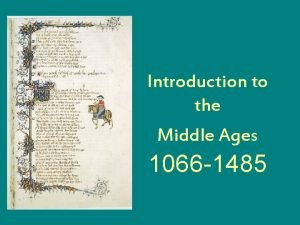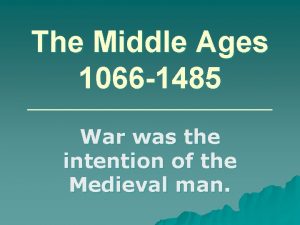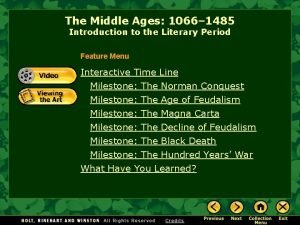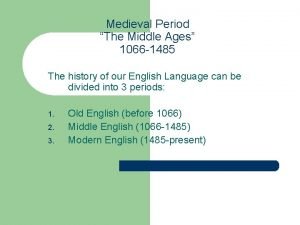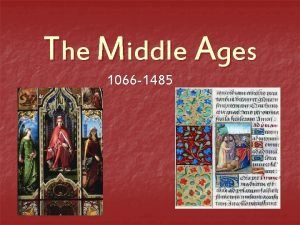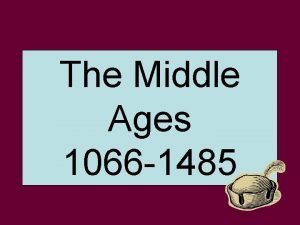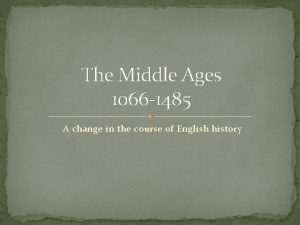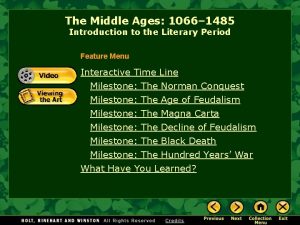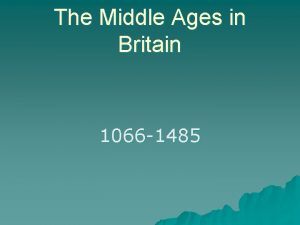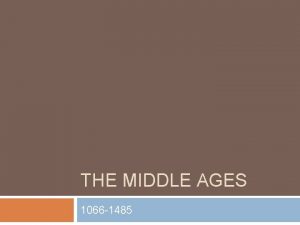The Middle Ages 1066 1485 1066 King Edward




















- Slides: 20

The Middle Ages 1066 -1485

1066 �King Edward the Confessor died without an heir �The Duke of Normandy (William the Conqueror) invaded England �This leads to a new, French influence �After 20 years, William I orders records of all land ownership, which becomes the Domesday Book

Rise of Feudalism � Feudalism= economic, social, and political position determined by birth

Problems with Feudalism �A strong vassal might decide to overpower a weak overlord

Knights � Servants to their lords � Trained to be warriors � Granted the title of “Sir” � Based on complex social codes (chivalry)

Women � No political rights � Subservient to husband, father, brother � Life of having and caring for children, housework, and fieldwork

Chivalry �System of ideals and social codes �Must take oath of loyalty to overlord �Governs warfare �Encouraged “courtly love” �Courtly love implies admiration and adoration (not physical love) �The admired lady was set above the admirer �Topic of many poems and stories

Romance �Courtly love and chivalry gave women an elevated status in some ways �BUT �Not really �Actual outcome: romantic heroes saving the day

Fall of Feudalism � More contact with the outside world= more business opportunities � Need for merchants, carpenters, stonemasons, other artisans � Yeomen, small landowners, replaced some of the knights

Effects of Fall of Feudalism �Art is more geared toward “middle class” �Writers such as Chaucer focused more on “city classes” �Ballads were sung in public gathering places • Song or songlike poem that tells a story in a regular pattern of rhythm and rhyme

The Decline of Feudalism Monetary System Before the Crusades • foreign coins are melted down • few coins exist • feudal lords make coins for use on their own property only • serfs use barter system After the Crusades • gold coins are used • peasants can earn gold in exchange for labor or goods • peasants can save money, have greater buying and selling power

Religious Happenings � The Crusades to free Jerusalem from Turkish control begin � The Knights Templar is founded • A religious order whose mission was to protect pilgrims to the Holy Land

The Crusades (1095— 1270) • series of holy wars • waged by European Christians against Muslims in the Middle East • ultimately unsuccessful • Europeans benefit from contact with Arab civilization

Benefits to Europeans from Crusades Examples of sophisticated culture to which Europeans were exposed include • public libraries in Damascus and Baghdad • wealthy cities such as Cairo providing links to spice trade • universities such as Al-Azhar University in Cairo, one of the oldest universities in the world • medical knowledge—first accurate study of smallpox and measles

Political Happenings � The Magna Carta � The Hundred Years War

The Magna Carta 1215 • Magna Carta—“Great Charter” • signed by King John, under pressure from English barons • protected rights of aristocrats • meant a return to more democratic tendencies No freeman shall be taken, or imprisoned, or outlawed, or exiled, or in any way harmed, nor will we go upon him nor will we send upon him, except by the legal judgment of his peers or by the law of the land. To none will we sell, to none deny or delay, right or justice. —Magna Carta, clauses 39 and 40

The Hundred Years’ War 1337– 1453 • war between England France • England unsuccessful • leads to British national consciousness Yeoman • small landowners with longbows • begin to become dominant force (instead of knights)

The final blow to feudalism The B lack Death

The Black Death 1348– 1349 Black Death (bubonic plague) • highly contagious and fatal disease, spread by the fleas on infected rats • factor in decline of feudalism England’s population is reduced by one-third. Labor shortage gives lower classes more bargaining power. Over time, serfs gain freedom.

The Black Death The symptoms of the bubonic plague included • blotches on the skin • hardening and swelling of the glands under the armpit or in the groin • delirium • insanity Death strangling a victim of the plague. From the Stiney Codex. Czeckoslovakia, 14 th century.
 The middle ages 1066 to 1485 unit test
The middle ages 1066 to 1485 unit test The middle ages 1066 to 1485 unit introduction
The middle ages 1066 to 1485 unit introduction The middle ages 1066-1485 unit test
The middle ages 1066-1485 unit test The middle ages 1066 to 1485 unit test closed book
The middle ages 1066 to 1485 unit test closed book Medieval time
Medieval time Dark ages vs middle ages
Dark ages vs middle ages Renaissance art vs medieval art
Renaissance art vs medieval art Early middle ages
Early middle ages Middle age floral design
Middle age floral design Cathedral art
Cathedral art During the middle ages noblewomen had
During the middle ages noblewomen had Manor system def
Manor system def Middle ages
Middle ages The middle ages outcome the power of the church
The middle ages outcome the power of the church Chapter 12 lesson 3 culture of the middle ages
Chapter 12 lesson 3 culture of the middle ages Germanic kingdoms in the middle ages
Germanic kingdoms in the middle ages The middle ages spans nearly one thousand years.
The middle ages spans nearly one thousand years. Middle ages jeopardy
Middle ages jeopardy Middle ages
Middle ages Monks and nuns in the middle ages
Monks and nuns in the middle ages Middle ages
Middle ages
